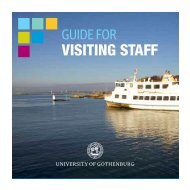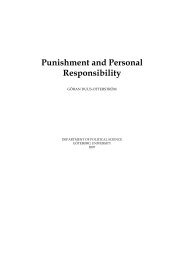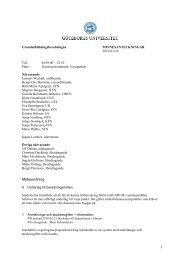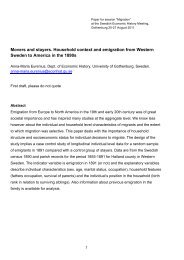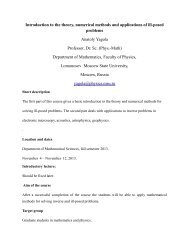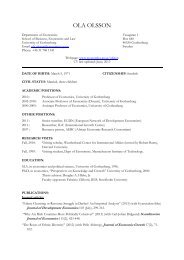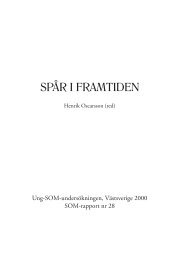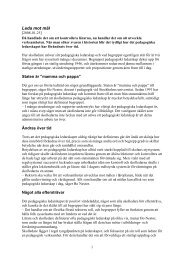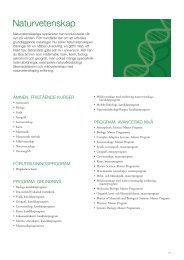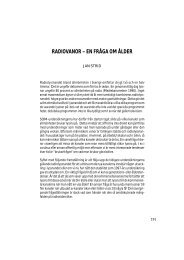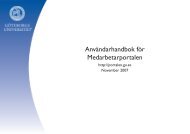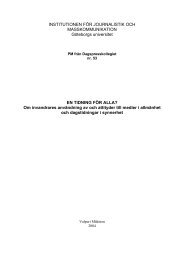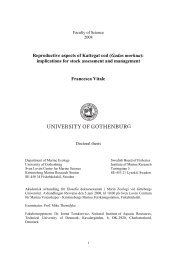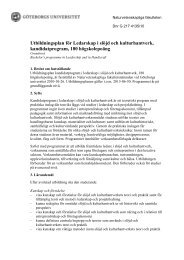development of small-scale intermodal freight transportation in a ...
development of small-scale intermodal freight transportation in a ...
development of small-scale intermodal freight transportation in a ...
Create successful ePaper yourself
Turn your PDF publications into a flip-book with our unique Google optimized e-Paper software.
shipment term<strong>in</strong>als. The aim is to avoid marshall<strong>in</strong>g that <strong>in</strong>volves waste <strong>of</strong> time and money<br />
as well as an <strong>in</strong>creased risk <strong>of</strong> damage.<br />
Roll<strong>in</strong>g highway is a particular form <strong>of</strong> <strong><strong>in</strong>termodal</strong> transport where complete lorry comb<strong>in</strong>ations<br />
are driven on board low-built railway wagons. The arrangement is today used for<br />
overcom<strong>in</strong>g physical barriers such as the Alps and the English Channel, but as many <strong>of</strong> the<br />
costs – such as capital costs for the lorry and salary for the driver – rema<strong>in</strong> to be borne by<br />
the hauliers, it is not regarded as a large-<strong>scale</strong> future solution for European <strong><strong>in</strong>termodal</strong>ism.<br />
The low net to tare weight ratio is another restra<strong>in</strong><strong>in</strong>g factor.<br />
The comb<strong>in</strong>ation <strong>of</strong> <strong>transportation</strong> modes <strong>in</strong> <strong><strong>in</strong>termodal</strong> transport implies that many actors<br />
are <strong>in</strong>volved. The European <strong><strong>in</strong>termodal</strong> market is traditionally divided between companies<br />
based upon rail and road transport respectively. Consider<strong>in</strong>g regulated monopolies and the<br />
historic scope <strong>of</strong> concessions, the borderl<strong>in</strong>es between market segments have been drawn<br />
accord<strong>in</strong>g to types <strong>of</strong> ITU and geographical markets. Due to transport policy deregulation<br />
<strong>in</strong> the European Union (EU), this practice is now dim<strong>in</strong>ish<strong>in</strong>g.<br />
The classic role <strong>of</strong> the railway companies has been to sell rail haulage between the <strong><strong>in</strong>termodal</strong><br />
transshipment term<strong>in</strong>als. They also operate term<strong>in</strong>als and supply rail wagons. In addition,<br />
the railway companies have owner <strong>in</strong>terests <strong>in</strong> many <strong>of</strong> the other companies needed<br />
for produc<strong>in</strong>g <strong><strong>in</strong>termodal</strong> transport services.<br />
When the conta<strong>in</strong>er was <strong>in</strong>troduced <strong>in</strong> shipp<strong>in</strong>g dur<strong>in</strong>g the 1960’s the railway companies<br />
founded conta<strong>in</strong>er transport companies <strong>in</strong> order to <strong>of</strong>fer complement<strong>in</strong>g land transport. Interconta<strong>in</strong>er<br />
(now Interconta<strong>in</strong>er-Interfrigo, ICF) was founded for <strong>in</strong>ternational transport<br />
and companies like German Transfracht and French Compagnie Nouvelle de Cadres (CNC)<br />
were founded for domestic transport. Swedish State Railways (SJ) formed a special bus<strong>in</strong>ess<br />
unit with<strong>in</strong> its <strong>freight</strong> division that has later been transformed <strong>in</strong>to the limited company<br />
Rail Combi AB. Today, Rail Combi AB is the pr<strong>in</strong>cipal <strong>of</strong> all <strong><strong>in</strong>termodal</strong> term<strong>in</strong>als <strong>in</strong> Sweden<br />
and <strong>of</strong>fers a wide range <strong>of</strong> <strong><strong>in</strong>termodal</strong> transport services us<strong>in</strong>g its own rail wagons. International<br />
transport is <strong>of</strong>fered <strong>in</strong> co-operation with other companies.<br />
Forwarders and hauliers have formed own national <strong><strong>in</strong>termodal</strong> transport companies such as<br />
Kombiverkehr <strong>in</strong> Germany, Novatrans <strong>in</strong> France and Swe-Kombi <strong>in</strong> Sweden. The orig<strong>in</strong>al<br />
purpose <strong>of</strong> the organisations was to organise the transport services that the road-based<br />
transport companies had concessions for. Now <strong>in</strong> the post-regulation days, they still arrange<br />
<strong><strong>in</strong>termodal</strong> services but their role as a strong counterpart to the railways <strong>in</strong> negotiations 9 is<br />
9 S<strong>in</strong>ce most hauliers and forwarders are Small- or Medium sized Enterprises (SMEs), they have perceived<br />
that need to jo<strong>in</strong> forces before approach<strong>in</strong>g the large national railways.<br />
5



